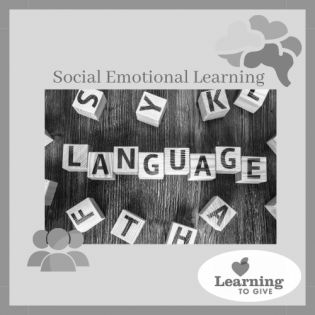SEL: Offensive Language Audit
SEL Connection:
- Self-Awareness: examine prejudices and biases
- Self-Management: demonstrate personal and collective agency
- Responsible Decision-Making: promote personal, family, and community well-being
- Social-Awareness: demonstrate empathy, concern for others' feelings
- Relationship Skills: communicate effectively, stand up for the rights of others
Warm-Up
Note: you may want to talk about this activity with the school counselor or youth director in advance, to consider possible youth reactions or how to respond to what may come up.
For younger youth:
- Distribute small paper hearts or have youth draw a heart shape on paper. Each person writes their own name on the heart.
- Ask participants to name examples of things that people say or do that hurt their feelings. Each time someone names an offensive word or action, they all wrinkle or fold their heart a little bit.
- After they have named several examples, ask how the heart looks. Discuss the effects that hurtful behaviors can have on someone’s heart. Ask how that damage can be healed. They may note that it is hard to get the wrinkles out, just as it is hard to erase the damage of hurting someone. They may feel a heartfelt apology and a change of behavior helps.
For older youth:
- Watch this video about the origins of some familiar phrases: "6 Phrases with Surprisingly Racist Origins"
- Talk about the video. Should knowing these origins change your usage? Words have power. They can destroy and create. Words have energy and the ability to help, to heal, to hinder, to hurt, to harm, to humiliate, and to humble. Write about a time when someone’s words had a negative or positive impact on you.
Say, “Today we will look at some words people use that are offensive to others and explore how we can get rid of that language." Define and discuss the meaning of offensive.
Activity Instructions
- Talk about words that offend some people, even if you don't intend to offend. For example, it may be familiar to say "that is so gay." While the person using the expression didn't mean any harm, the word gay in this situation is used to mock or insult, which links something negative with someone who is gay. This hurts an already victimized group of people. It doesn't help them gain acceptance. Similarly, it is never OK to say, ‘you act like a girl (or look like a boy)’ as a put-down. Talk about why this is hurtful.
- Distribute the handouts below and say, "Today we are going to do an audit of our language to identify offensive language. An audit is an examination, and we are going to examine the language we hear and use.”
- Go over the handout directions for doing an offensive language audit.
- Discuss the language they hear and fill in the chart together, coming up with better expressions and even ways to respond when others use offensive language.
- Extension: This observation and examination of language can also be completed from home over several days where participants listen to people at home, in the media, and in the community.
- When they come back together, discuss their observations and language alternatives.
Whole Group Discussion Questions
Ask participants to voluntarily share the words they heard and used, as well as their alternatives, and have a group discussion about why the words or phrases are offensive, and what is a better way to communicate.
-
What words did you become aware of that might offend someone else? Why are they hurtful? What are some better words to use in each case?
-
Why isn't it okay to use offensive words when the people the words offend aren't around?
-
Someone might say, you're being too sensitive. Why is it good for all to make this shift?
-
What can we do if we hear other people using words that are offensive?
-
What tips might help us remember to think before using an offensive word?
Self Reflection Writing Prompts
- Write, draw, or create a video message about your intentions to use respectful language and make others aware when they use language that hurts someone.
Wrap Up
Make a P.A.C.T with yourself to use Inclusive Language instead of Offensive Language
P is for Plan - Identify one word/phrase you want to stop using.
A is for Action - Find inclusive replacement words/phrases to use instead of offensive language.
C is for Consistency - You’ve taken your first step. Now remind yourself why you’re doing this and focus on the day-to-day steps.
T is for Time - Let time unfold. Change won’t happen overnight. Keep working toward your goal!
Extension
- Facilitate a family meeting to discuss the Offensive Language Audit. Create suggestions for replacement.
